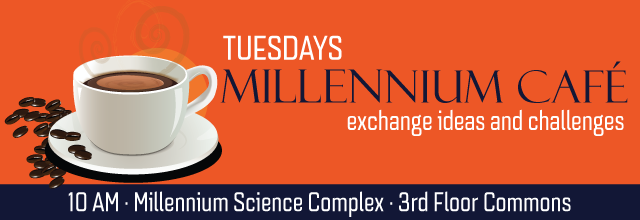
The Millennium Café will return April 1, 2025.

The Millennium Café will return April 1, 2025.
The Millennium Café will return April 1, 2025.
Enjoy your spring break.
More than 100 communities in Pennsylvania critically depend on levees for flood safety. Levee infrastructure needs to adapt to changing flood conditions, but most communities lack the resources to do so. We are developing transdisciplinary approaches to address this nationwide challenge which involve scholars, government officials, and practitioners. This talk will focus on the unintended impacts and hidden costs of levees—a new dimension of the challenge that needs recognition to make sustainable progress.
Alfonso Mejia
Civil & Environmental Engineering
Glass has been a cornerstone of architecture for centuries, from the windows of cozy homes to the façades of towering skyscrapers. Yet, the way we manufacture it has remained largely the same: an energy-intensive process that pumps out tons of CO₂ every year due to high melting temperatures and ingredients that release additional CO₂ upon decomposition. Enter LionGlass™: a revolutionary glass family developed by our Glass Research Lab at Penn State. LionGlass™ not only melts at ~400°C lower than standard glass, but also eliminates the use of CO₂-releasing ingredients, thereby offering the potential to reduce emissions by more than half. Moreover, it demonstrates >10x times the crack resistance of the glass we use today. We are on a mission to transform LionGlass™ into the next generation of energy-efficient windows, aiming to demonstrate how even a simple sheet of glass can reshape the industry and play a pivotal role in building a sustainable future. This work is sponsored by a seed grant from the Cocoziello Institute of Real Estate Innovation.
Mehmet Ozay
Chemical Engineering
Despite its inception during the World War II era, the field of ultrasound biomedicine has enjoyed an explosion of new diagnostic and therapeutic capabilities, driven by advances in materials science, electronics miniaturization, and image processing. This talk will highlight ongoing collaborative research developing ultrasound nano-contrast agents that enable non-invasive and real-time imaging of physiologic phenomena at the single cell level. Current efforts seek to link these materials-enabled advances with innovations in acoustic hardware and image processing approaches to create an Acoustic Medicine consortium that will accelerate ultrasonic life science research across the university.
Scott Medina
Biomedical Engineering